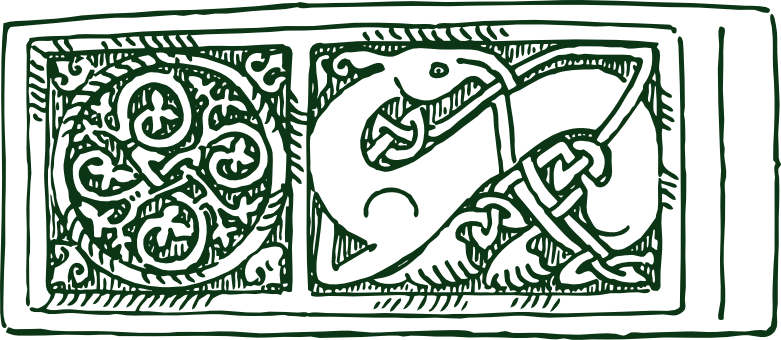David F. Devereux
Articles by this author
|
|
|
E A Hornel and Kirkcudbright Recent, Recent (Social), Recent (Literature & Art), History, Parish History, Genealogy TDGNHAS Series III, 81 (2007), 115(2.95 MB)
Abstract
This paper is based on the script of a lecture entitled ‘E A Hornel Citizen of Kirkcudbright’ presented by the author as a contribution to a study day arranged by the National Trust for Scotland, which took place in Kirkcudbright, on May 13 2006. |
|
An Observation of Kirkcudbright's Town Wall Mediaeval, Post-mediaeval archaeology, Recent TDGNHAS Series III, 82 (2008), 136(2.63 MB)
Abstract
Brief report of the exposure of traces of Kirkcudbright's town-wall in the garden ground at number 62 High Street. The evidence from the excavation supports other similar exposures within the burgh. |
|
Favourites from the Stewartry Museum [Presidential Address - a Lecture to the Society, 5th October 2007] Proceedings, Museums, History, Recent (Literature & Art), Recent (Social) TDGNHAS Series III, 82 (2008), 156(2.63 MB)
Abstract
In an illustrated lecture, the retiring President, David Devereux, Museums Curator for the Stewartry in Dumfries and Galloway Museums Service, presented a wide variety of archaeological and local historical artefacts, fine and decorative art, photographs, |
|
The Lochenkit Moor Covenanters – a Newly Discovered Account of a ‘Killing Times’ Incident TDGNHAS Series III, 83 (2009), 229(WARNING large file size: 5.11 MB)
Abstract
The killing of four Covenanters by Crown forces on Lochenkit Moor near present-day Crocketford in Kirkcudbrightshire in early 1685 was one of the most notorious events of the ‘Killing Times’. Today, a walled enclosure protects the site of their grave and an impressive obelisk nearby records the circumstances of their killing2. However, an account of the incident has been recently discovered in a manuscript book held in the Stewartry Museum in Kirkcudbright, which, if accurate, offers an alternative interpretation of the event. |
|
David F. Devereux and Douglas Irving Rev David Edward Marsden MA, BA, DPS (1929 – 2009) TDGNHAS Series III, 83 (2009), 245(WARNING large file size: 5.11 MB) |
|
Two Letters from Joseph Train Relating to His Early Literary Career and Collaboration with (Sir) Walter Scott TDGNHAS Series III, 84 (2010), 161(3.44 MB)
Abstract
A recent review of the archive collections held in The Stewartry Museum, Kirkcudbright has brought to light two letters2 written by Joseph Train to his friend John Stobo, a Sergeant in the Ayrshire Militia. Joseph Train (1779-1852) was an Excise officer from 1808, working in various parts of Scotland until his retirement to Castle Douglas. He was one of south west Scotland’s earliest antiquaries and is particularly known as a correspondent of Sir Walter Scott for whom he collected and supplied traditional and historical information from this area3 . This information inspired and provided the historical basis for several of Scott’s poetical and prose works. |
|
Joseph Train, Robert Malcolmson and the Collection of Folklore for (Sir) Walter Scott and James Hogg Recent (Literature & Art), Folklore TDGNHAS Series III, 85 (2011), 161(3.42 MB) |
|
The Men of the North: The Britons of Southern Scotland by Tim Clarkson TDGNHAS Series III, 85 (2011), 168(3.42 MB) |
|
David F. Devereux, Alison Greenshields and Elaine Pattison Corporal Donaldson’s Complaint: An Example of Military Support for the Board of Customs in Counter-Smuggling Activities in Early Eighteenth-Century Galloway History, Smuggling, Military History, Administration TDGNHAS Series III, 87 (2013), 191(WARNING large file size: 5.67 MB) |
|
Mary Queen of Scots and Her Escapes by A.E. MacRobert TDGNHAS Series III, 87 (2013), 199(WARNING large file size: 5.67 MB) |
|
David F. Devereux and John Pickin Tongland Fish House and the Tongland Salmon Fishery Post-mediaeval archaeology, Recent, Fisheries TDGNHAS Series III, 89 (2015), 35(4.65 MB)
Abstract
A Building Record of the Fish House at Tongland was made by the authors in November 2013, prior to the re-development of the building. This revealed the nature of the midnineteenth century structure and reflected its use in relation to the seasonal salmon fishery at the nearby Doachs of Tongland on the River Dee. There is also anecdotal evidence for its operation, which included the dispatch of salmon to distant markets. The fishery closed in the 1930s with the development of the Galloway Hydro-Electric Scheme, but a range of documentary evidence indicates that this was a valuable (and sometimes controversial) fishery, operated as an economic unit from 1642 and probably much earlier. Quite possibly the canons of nearby Tongland Abbey exploited this natural resource from the early thirteenth century, although there is no surviving physical or documentary evidence for this. |
|
Secret Dumfries by Mary Smith and Keith Kirk TDGNHAS Series III, 91 (2017), 134(4.71 MB) |
|
Excavations at Tongland Abbey TDGNHAS Series III, 91 (2017), 148(4.71 MB) |
